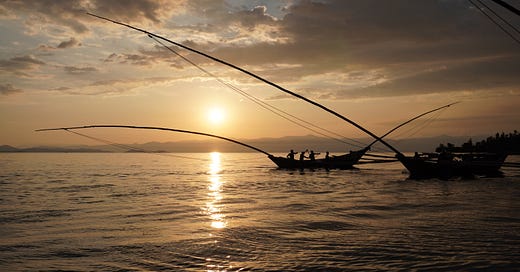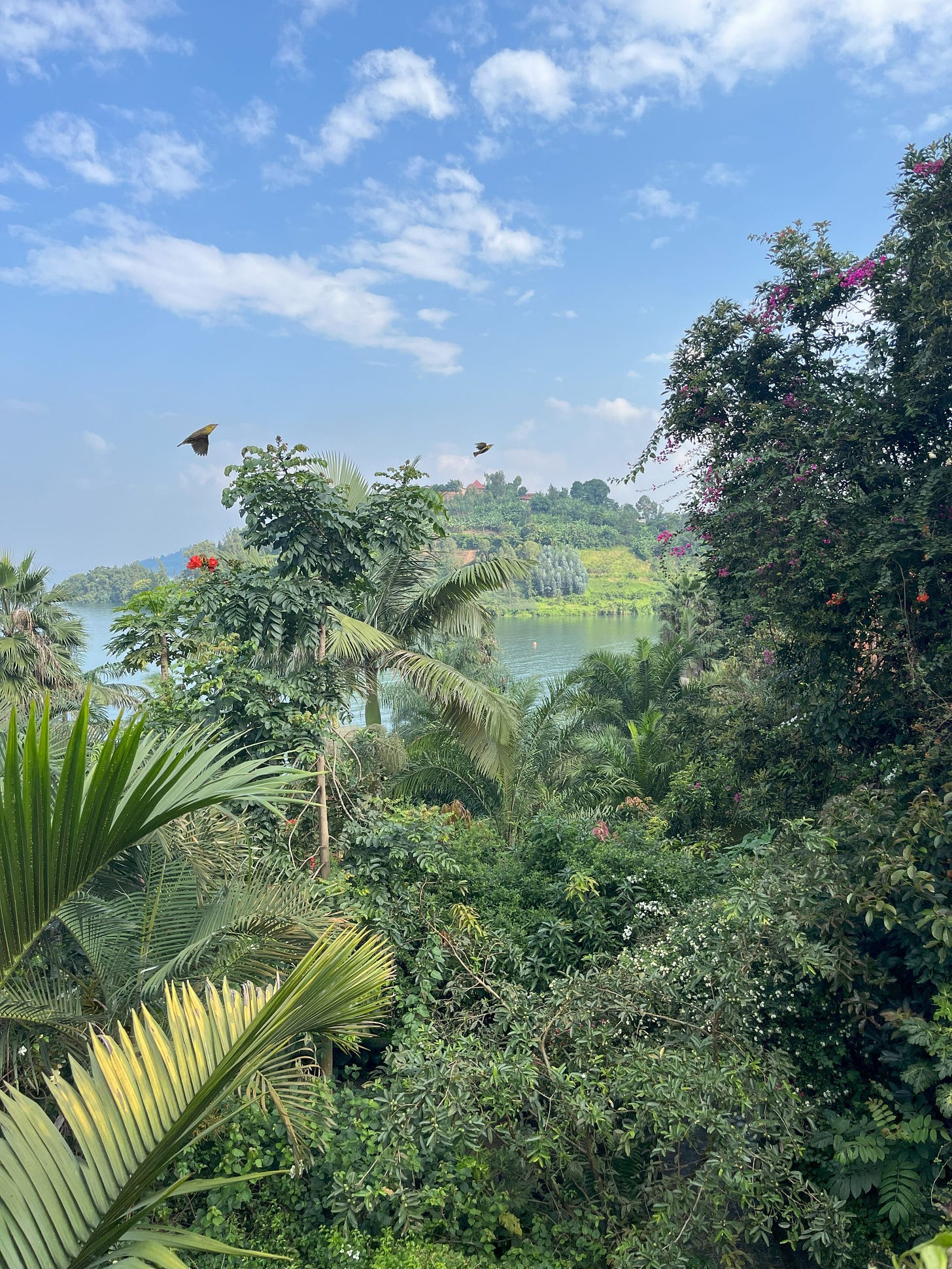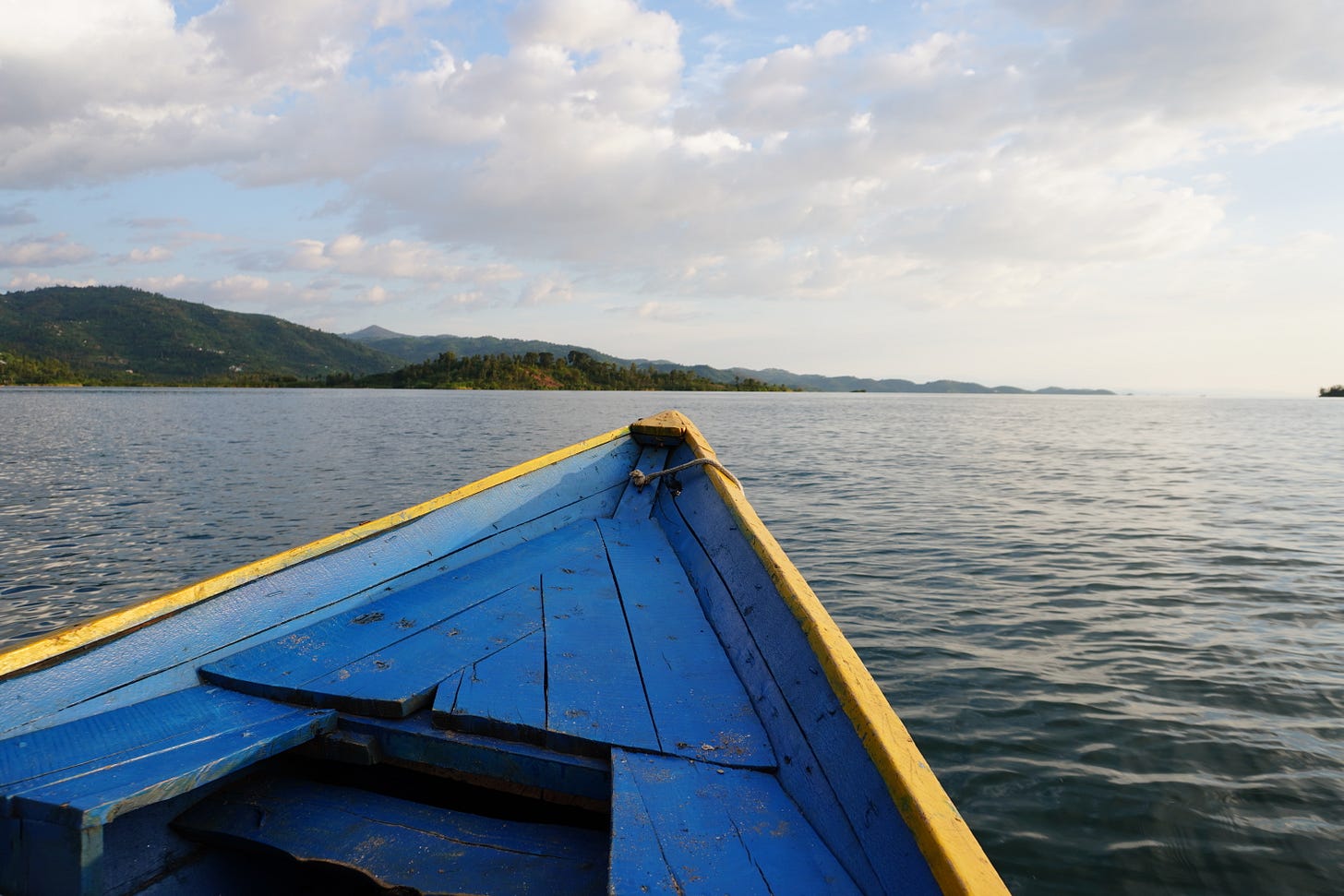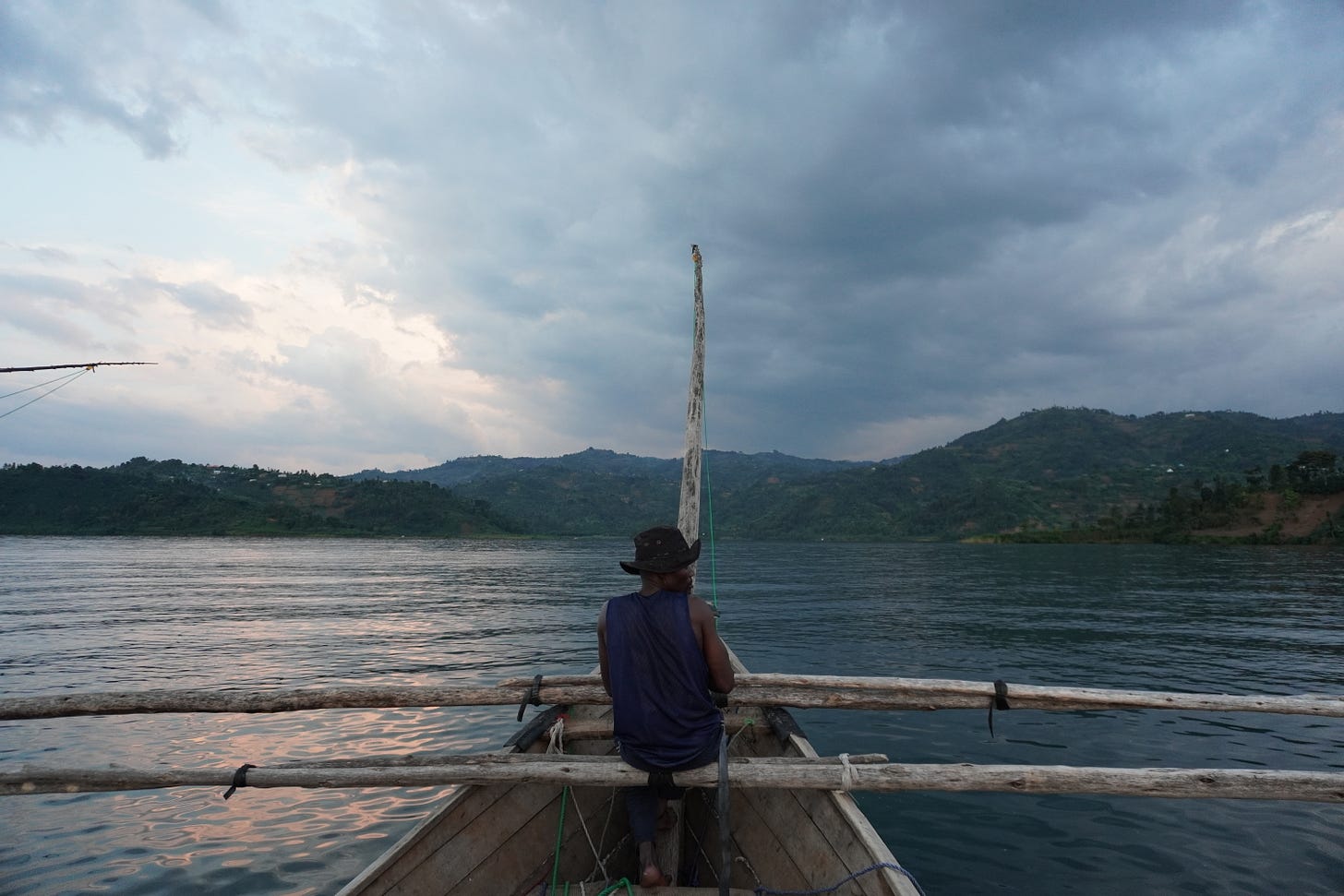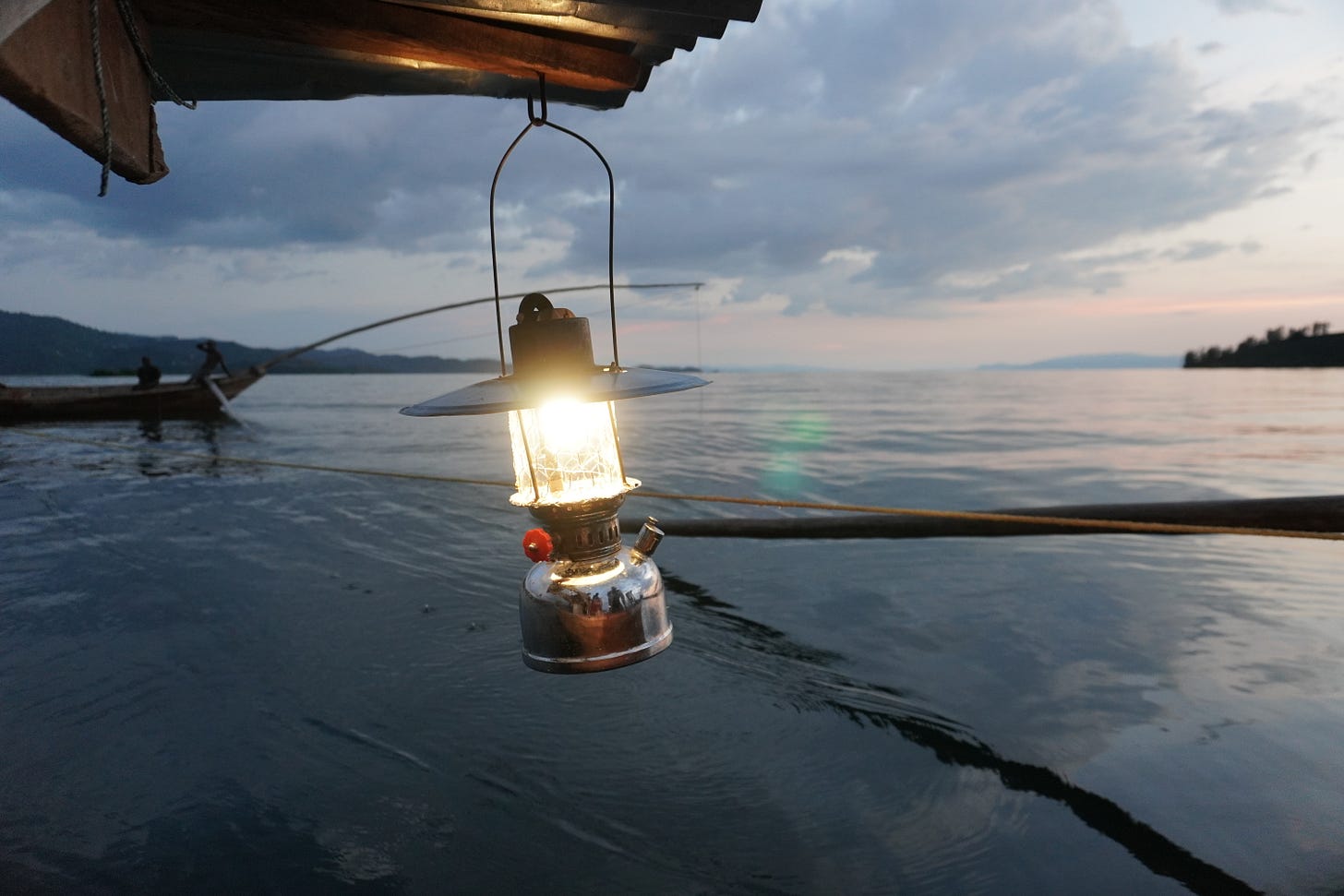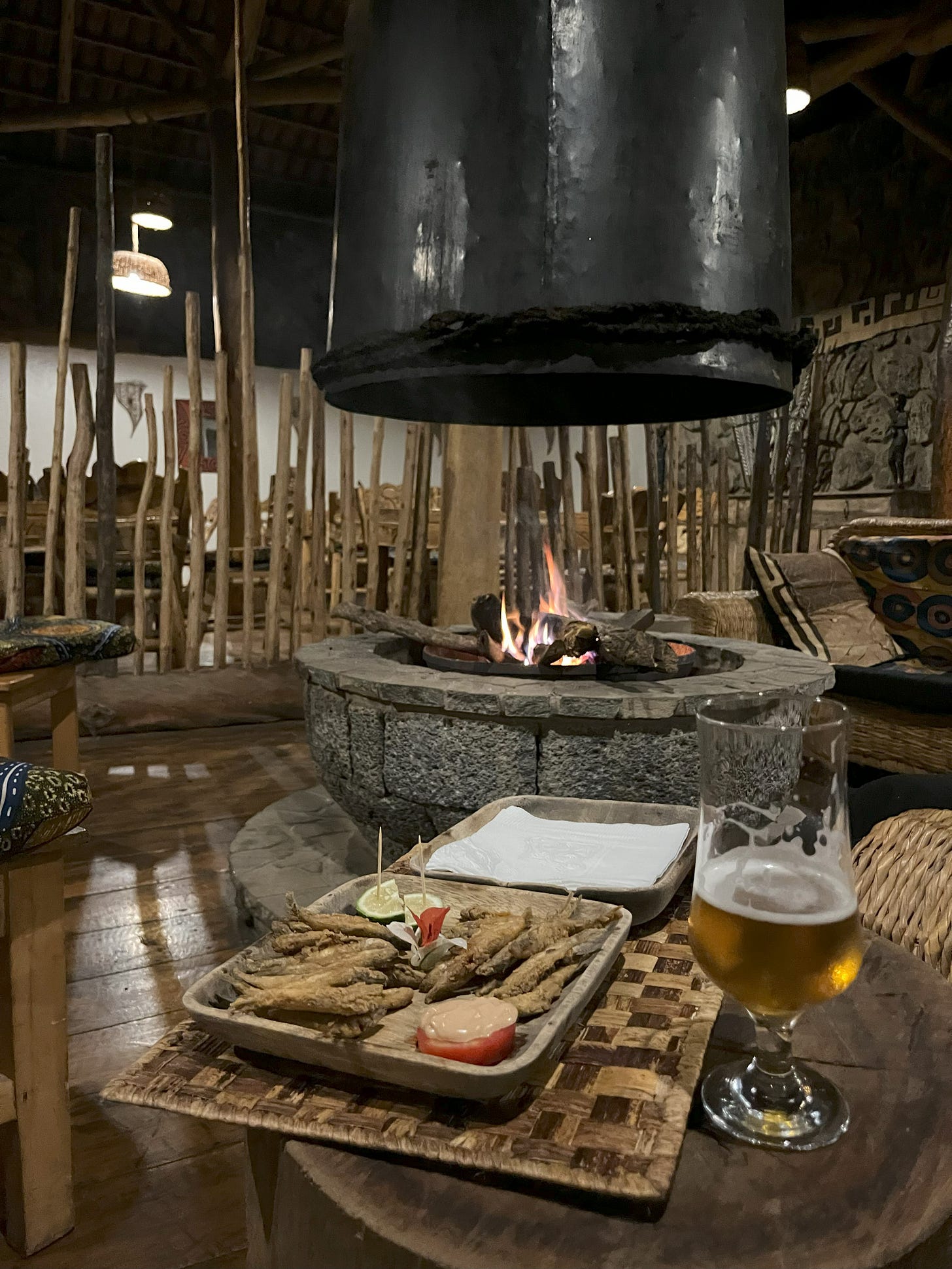I live by a lake where there’s another country on the other side of it. It’s normal here, for the borders to be porous. 7% of Switzerland’s workforce does not reside in Switzerland. My friends pop to France for their grocery shopping. I could take the ferry across daily, and it would be exceptional to get asked for ID.
Lake Kivu has an invisible wall.
“Over there is Goma,” my guide Emmanuel points. “Democratic Republic of Congo.”
Under this expanse of sky, Goma looks unsuspecting. White Lego buildings of one or two floors, the occasional orange roof. Our skipper presses his lips and doesn’t move his gaze from the direction we’re travelling in. It keeps me silent as the city gets smaller.
The water is flat except for the letters we carve through it. Its edges meet an undulating green, so vivid, so luscious, interspersed with villas and hotels. There’s a vastness I can’t quite take in. It’s enormous. It’s Eden with palm trees. We wave at some fishermen going by and they give us an even grander wave back in front of the sinking sun.
“Isn’t that, you know, a bit dangerous right now?”
Three days earlier, I had a meet-cute in Kigali in that romanticised way that only happens when you’re abroad. It was in a bookshop café, me working furiously on my laptop, him reading a French tome with dictionary sized print. I told him my plans.
“You’re basically going to the DRC in three days,” he said.
“Am I?”
He showed me the dot where I was heading on his phone, mirth at my ignorance all over his face. He was an expat, his hair pulled up in a short ponytail with a few strands escaping round his ears. He told me raved in Uganda. Hitchhiked to South Africa. He had mirror grey eyes and was incredulous that I had booked a private guide to travel with.
“I’m here for work and it all got organised at the last minute. I didn’t check what I was doing.”
I sounded idiotic. My Slack messages racked up as we spoke. It was the truth though, I didn’t have the brain space when I extended this business trip, sending harried emails to a tour operator. Without the luxury of elastic time, I travel differently now. I spend more and trust others to do the planning for me.
“I’m sure you’ll be absolutely fine,” he said. “It’s beautiful, you’ll enjoy it.”
My lifejacket is cumbersome and rises high above my shoulders. I wonder if I should send him a picture. Whether he’d bother with a life jacket if he was here. I have been with roamers before, adrenaline searchers who gulp life and countries whole. These men can swallow you too.
Emmanuel is loving the ride. He keeps rocking the boat as he takes photos from one side to the other, the wind in his face. We’ve had two days moving north of Kigali in fast forward. Me putting reggae on through the Jeep, him telling me stories, of a childhood in a refugee camp. He tends to purse his lips and raise his chin before breaking into a laugh, letting the jokes air first. He is the only middle-aged person I’ve met in Rwanda who still has his mother.
“I told you dear girl, that if we rushed, we’d get the perfect sunset,” he says.
In the mornings, I’ve been stealing boiled eggs from breakfast and peeling one for him in the car. Each time, he threatens to eat them in one bite.
“Emmanuel, everything has been perfect.”
The fishermen are heard before they are seen. Their song is split with call and response, their movements brusque. Three canoes are held together with wooden poles with four men to each boat, most without shirts. The muscles on their backs form their own waves as their oars touch the surface of the water. We get closer and all fall still in our mutual curiosity.
A comment and they break into laughter. It’s a human second where language does not need to be universal. I am the only tourist, the only woman. I swallow my discomfort and arm myself with kindness. I grin like a loon.
“Come here, I’ll help you on,” the skipper says. He’s got his hand out for me to step onto the middle boat.
“Go ahead, I’ll wait for you here.” Emmanuel says. I curse myself again for not reading the small print. I hike up my skirt. My camera swings around my neck.
The sky puts on a grand finale and the men get to work in silence before the curtain comes down. They travel barefoot between the boats, using the rods like tightropes. They tie knots and cast their nets. Emmanuel takes a photo of me from our boat and almost falls in, his arms windmilling like something you’d see in a silent movie. I cackle and the sound rips across the air.
“This traditional way of fishing has been taking place for hundreds of years,” the skipper says.
The boat bobs and all sense of time is lost. I am so out of place, so far from home. I have tarpaulin round my feet. There’s a young boy aboard who turns his head every time I try to catch his eye. Kerosene is poured into lanterns that I am instructed to hook. It is light that will draw up the tiny silver fish that their livelihoods depend on, that will get tossed like coins in their nets.
“If you like, you’ve been invited to stay out for another hour.”
Voices stay low. Heavy clouds are starting to draw in the dark. Watching the fishermen set up for the night is one of the most beautiful and haunting things I have ever seen, but it’s starting to get cold. I have been observed as much as I am observing.
“Thank you, but I’m ready to go back now.”
The boy will be out until dawn.
On our way to shore, enormous drops of rain start to fall that cut through diagonal. We accelerate through the night, huddling and squinting by the motor. A flash of light is doubled by its reflection on the water. A dull, thunderous sound.
“What on earth was that?” I ask.
“It’s a plane,” The skipper says, too fast. “It’s a plane.”
“That’s not a fucking plane,” I say. Goma is far but in sight. Its dotted lights burst and blur with noise that is new yet known.
“The situation right now, it’s not good.” Emmanuel is having to shout.
The thud of my heart. Each sense alert. Another clap across the lake.
“Rwanda is a safe country, nothing bad can happen to you here.” the skipper insists.
The lake’s technicolour banks have turned black and grotesque. Leaves loom and spike like claws. The water has darkened to ink.
“You know before, armed rebels used to hide in these hills.” Emmanual says, only to me. “M23. They are experts at hiding.” His pout again. A palm in the air. “But don’t worry, nobody can get across the border. Nobody can cross.”
“I’m not sure if that’s helping,” I say. There’s a stutter of artillery.
His hand snakes to the small of my back. It could be comfort, but it feels like a question. Neither are wanted. Rainwater drips from my hair and rolls down my neck. I concentrate on the spurt of the engine and will it faster. If my mother knew what was happening, I think, I’d be dead anyway.
We reach the hotel and my entire body tingles, ready to sprint. There is no need. On land, everyone has exhaled. The rain has left a thick air behind that feels like a rescue blanket. There are bombs in paradise but on the other side. Over the invisible wall.
“Can I take your photograph?”
Before I say yes, the skipper’s phone clicks. I imagine what I look like when he shows someone else, his catch of the day, sodden and overwhelmed. We shake his hand goodbye.
“I’ve never seen the singing fishermen before.” Emmanuel says, “that was a special experience.”
“Special is one word for it.”
We are warming up by a fire and sharing a plate of fried sambaza. Never has fish tasted so good, never have I had such appreciation for the labour. There are no other guests. I am grateful that the internet doesn’t work, so I can’t text anyone where I am. Sounds of conflict can no longer be heard. Hands are kept to themselves.
At dawn, I give up all efforts to sleep and take my book outside. There is birdsong like no other, an abundance of flowers and trees to make your heart ache. Out on the water, three canoes glide past in a row. Even from here, I can hear the men sing.
I live by a lake where there’s another country on the other side of it. I am relieved that on Kivu, the borders can’t be crossed. But conflict pollutes the water that livelihoods depend on. I am sorry for my ignorance, humbled by my own stupidity that takes travel for granted at the expense of my own safety. I am mindful that for many, that fear is a daily reality. I will forever be grateful for what I saw.
When we bear hug at the airport, Emmanuel and I have tears in our eyes.
Stamps of approval
Since I travelled, the United States have issued a travel advisory for border areas close to the DRC’s North and South Kivu provinces. There’s more advise from the UK foreign office here.
But I would like to insist, just like the skipper, that Rwanda is a safe country. Kigali is a fantastic city and I had no issues getting about alone. Unlike me, keep on top of local media before making plans. It’s also worth monitoring the recent Marburg outbreak.
You can read about my gorilla trekking experience here.

